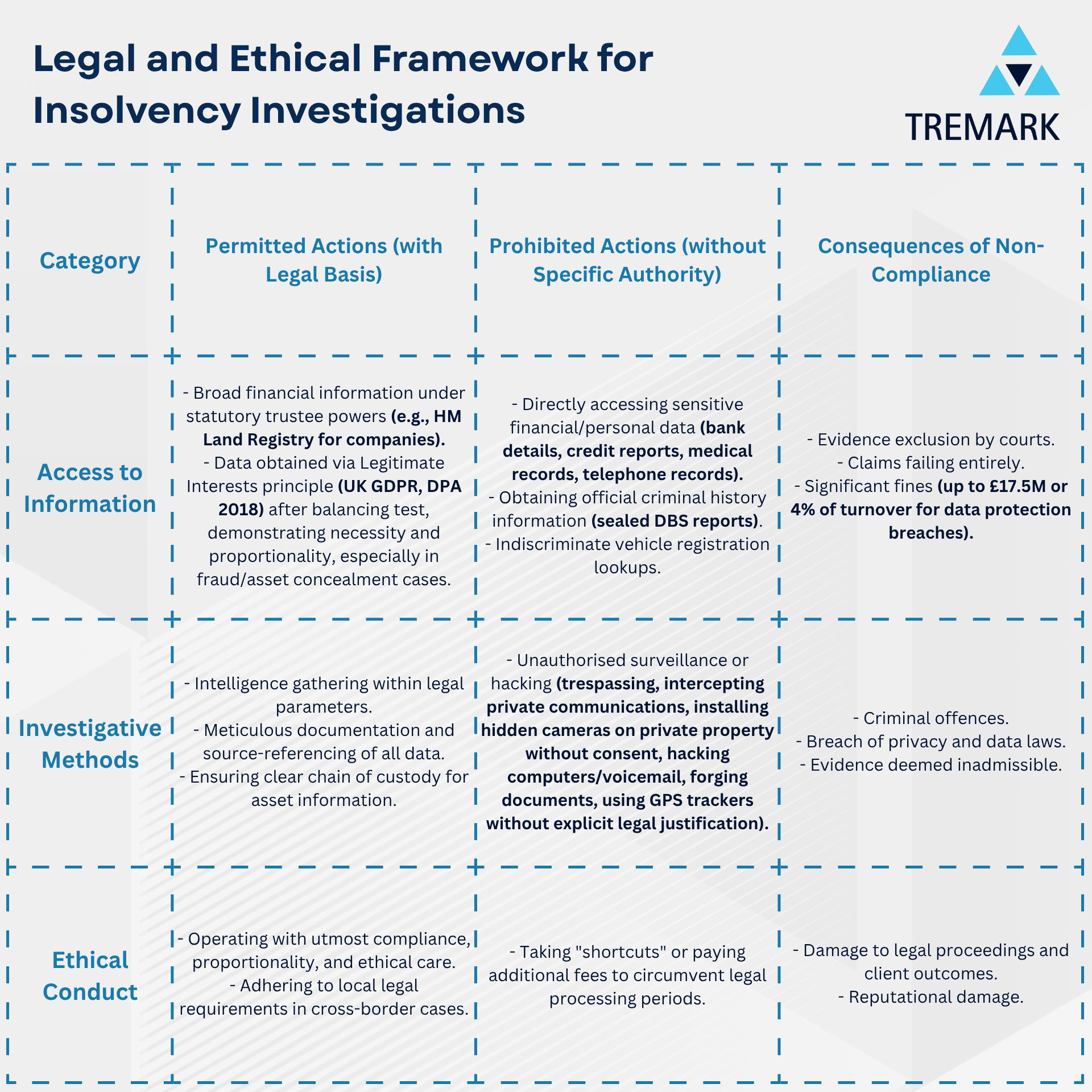Insolvency Services and The Professional Investigator
Insolvency Services and The Professional Investigator
Insolvency services have become far more complicated than they used to be, now often involving advanced investigations that go beyond basic financial checks. Because of these changes, insolvency professionals – like liquidators or administrators – need more than just accounting and legal skills. They often need help from professional investigators to handle complex issues such as hidden assets, fraud schemes, and international complications.

Bringing in investigators early in a case is a modern strategy that helps insolvency practitioners get ahead of potential problems. Early investigations can uncover hidden assets and potential fraud attempts sooner, which helps reduce losses and maximise the funds available for creditors. This approach lets practitioners make smarter, more informed decisions about whether the cost of an investigation is worth the potential return.
The Role of Professional Investigators in Modern Insolvency Services
Professional investigators help insolvency practitioners by providing early intelligence and performing a thorough pre-litigation analysis. This initial assessment helps determine if a debtor has assets worth pursuing and if the cost of recovery efforts is justified.
A key challenge in insolvency services is making sure that the effort and cost of recovery are in proportion to the value of the assets at stake. Investigators help solve this problem by gathering information that can either uncover hidden assets or, just as importantly, guide practitioners away from dead ends. This is helpful in cases involving corporate fraud or asset concealment. The investigator’s role is to provide objective information, allowing the practitioner to make informed decisions rather than determining wrongdoing themselves.
Legal and Ethical Framework for Insolvency Investigations
Insolvency investigations must operate within strict legal and ethical boundaries. The legal authority for these insolvency investigations comes from two main sources: the statutory powers of trustees in bankruptcy and the “legitimate interests” provision under data protection laws.

Without statutory powers, investigators must rely on the legitimate interests basis outlined in UK law (the Data Protection Act 2018 and UK GDPR). This requires a balancing test, where the need for the data must be shown to outweigh an individual’s right to privacy. This is particularly sensitive in cases of suspected fraud, where investigative activity must be necessary, proportionate, and fully documented.
There are strict limits on what private investigators can do to support insolvency services. They cannot obtain confidential data like bank details, credit reports, or medical records without specific legal authority. Prohibited activities also include unauthorised surveillance, hacking, or trespassing, which are illegal and can result in severe penalties. All information gathered must be meticulously documented and sourced, as courts can reject evidence that was obtained illegally or unreliably.
A real-world example of this is a case where a London law firm’s claim failed because a private investigator unlawfully fast-tracked land registry documents by bribing an official in West Africa. Given the potential for substantial fines for non-compliance, (penalties for serious violations can reach £17.5 million or 4% of global turnover), it is now essential for insolvency practitioners to select a professional investigator firm with a clear commitment to legal and ethical standards. An investigator’s expertise in compliance is just as valuable as their investigative skills.

Addressing Global Challenges: Cross-Border Insolvency Services and Asset Recovery
Insolvency services often cross international borders, creating new challenges due to different legal systems and regulations. Tracing and recovering assets hidden across multiple countries or in complex offshore entities requires specialised expertise.
A key challenge in cross-border cases is the concept of a “Centre of Main Interests” (COMI). Since the definition of COMI can vary between countries, it can create uncertainty and lead to “forum shopping” where parties seek the most favourable legal system.
Successful cross-border insolvency support requires investigators to have a deep understanding of international legal frameworks and the ability to operate across diverse legal systems. This appreciation for the geopolitical context and its impact on legal interpretations is crucial for planning effective asset recovery in a globalised world.
Competence, Compliance, and Future Outlook for Insolvency Practitioners
The effectiveness of insolvency services relies heavily on the competence and compliance of professional investigators. Insolvency practitioners must be diligent when choosing investigators, insisting on demonstrable competence, strict legal and ethical compliance, thorough documentation, and adherence to industry standards like accreditation and insurance.

This trend points toward the formal professionalisation of insolvency support services. As the stakes rise, practitioners cannot afford to work with investigators who operate outside legal and ethical boundaries. This creates a demand for firms that not only possess investigative skills but also demonstrate a strong commitment to compliance.
Looking ahead, professional investigators will continue to be a strategic resource for achieving successful and legally sound outcomes in insolvency services. Their skills in navigating complex financial situations, combined with a commitment to legal and ethical standards, will be crucial for the future of insolvency practice.
Conclusion
The modern landscape of insolvency services demands a sophisticated approach, with professional investigators playing an increasingly important role. Their contribution extends from providing early intelligence and strategic cost analysis to navigating complex legal and international challenges.

Adherence to stringent legal and ethical standards is not merely a burden but a core element that ensures evidence is admissible and that proceedings are successful. The rising risks of non-compliance highlight the growing need for professionalisation within the investigative sector. Ultimately, the partnership between skilled insolvency practitioners and highly competent, compliant investigators is key to achieving commercially sound and legally robust outcomes in the complex world of insolvency services.
Navigating a complex insolvency case? Partner with Tremark to find the answers. Fill out the form below to connect with our team of compliant and competent professional investigators.
FAQ’s
Q: When is the best time to bring in an investigator?
A: Early! Bringing in an investigator at the start of a case is a modern, strategic approach. It allows practitioners to uncover potential fraud and hidden assets sooner. This also helps in assessing whether the cost of an investigation is justified by the potential return.
Q: What exactly do investigators do in an insolvency case?
A: They provide early intelligence and perform pre-litigation analysis. Their role is to help determine if there are assets worth pursuing and if the cost of recovery efforts is justified. They are experts at gathering objective information to either uncover hidden assets or, just as importantly, guide practitioners away from dead ends.
Q: What should an insolvency practitioner look for when hiring an investigator?
A: You need to be diligent. Look for demonstrable competence, strict legal and ethical compliance, thorough documentation, and adherence to industry standards like accreditation and insurance. The stakes are too high to work with anyone who operates outside legal boundaries. A firm’s commitment to compliance is just as valuable as its investigative skills.
Categories
- Guidance
Popular Blogs









